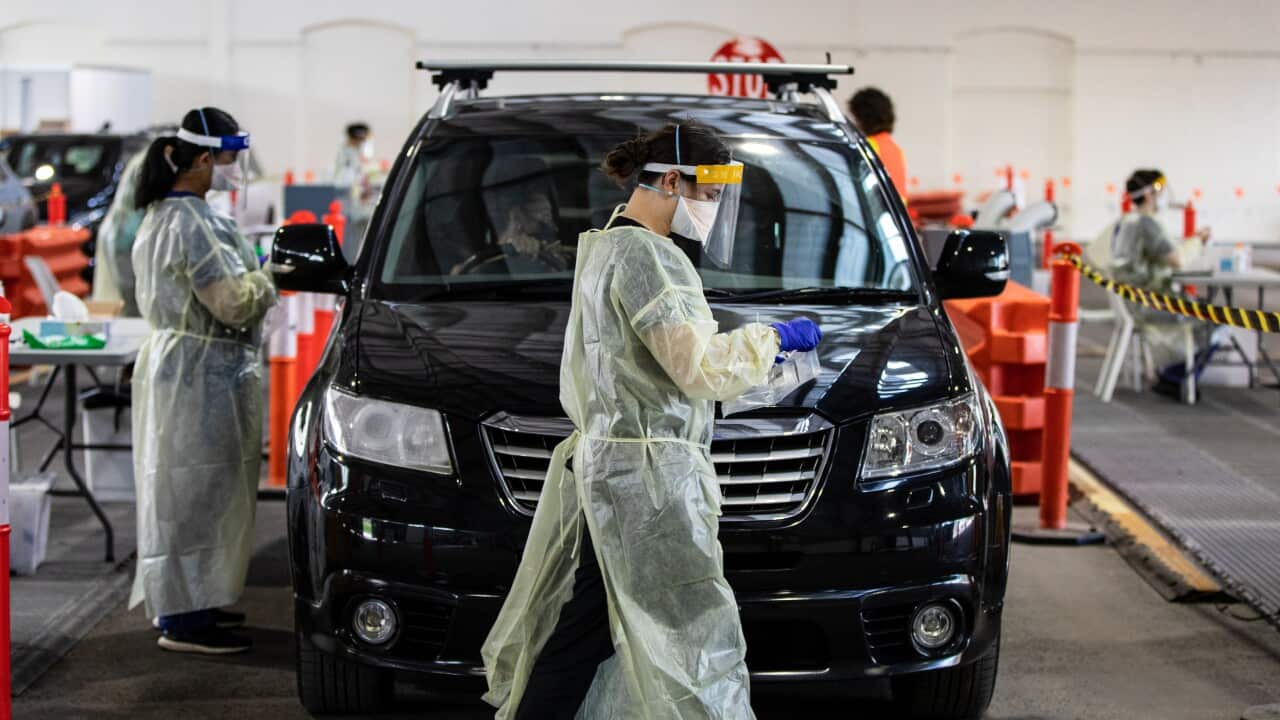Australia has recorded another 39 COVID-19-related deaths.
Victoria reported 14 fatalities and 10 people died in Queensland. There were eight deaths in NSW, three in Tasmania and two in South Australia on Wednesday.
Western Australia reported two historical COVID-19 deaths.
A further 18,265 cases were reported in NSW, 10,907 new infections in Victoria, 9,176 in Queensland and 7,462 in Western Australia.
South Australia had 4,986 new COVID-19 cases, 1,839 in Tasmania, 1,073 in the ACT and 513 in the Northern Territory.
There are 1,583 people with COVID-19 that are hospitalised in NSW, including 71 in intensive care units (ICU).
In Victoria, 391 people with the virus are in Victoria hospitals, including 19 in ICU; 597 patients in Queensland hospitals have COVID-19, including 16 in ICU; 215 people are hospitalised in Western Australia, including four in ICU; 220 patients in South Australian hospitals are infected with the virus, including 11 in ICU; there are 48 people in hospitalised in Tasmania, including one in ICU.
Elsewhere, 32 people are hospitalised in the Northern Territory, including two in ICU and 61 people are hospitalised in the ACT, with two in ICU.
It comes as both Queensland and Victoria say their health systems are under pressure.
Queensland's acting premier Steven Miles on Wednesday assured Queenslanders their "world-leading" health system was doing its best to cope with a second Omicron wave of COVID-19 after this week recording the fourth-highest volume of triple zero calls.
There are currently 597 patients with COVID-19 in Queensland hospitals — the highest number during the current wave.
Mr Miles backed Queensland's health system but welcomed federal Opposition leader Anthony Albanese's urgent care clinic plan, saying it addressed a national problem.
Mr Albanese on Wednesday outlined a trial of 50 urgent care clinics across the country in order to offer an alternative to busy hospital emergency departments.
"It's designed to address those urgent care needs, that will be interesting to have a look at," Mr Miles said.
"We need to consider all those solutions to what is not just a problem with our emergency departments or ambulance service but a problem with our entire health system including primary care, GPs, aged care and disability support."
Mr Miles urged Queenslanders to avoid emergency departments if they could, steering people toward the 13HEALTH advice phone line serviced by nurses.
He said the new Omicron wave — Queensland has 55,535 active cases — and the unavailability of bulk billing GPs, along with more than 3,000 health workers in quarantine had a major impact on the state's emergency departments.
However, Mr Miles said the response time for code one calls was still just under nine minutes and "99 to 100 per cent" of emergency department patients were seen within two minutes.
Victorian Premier Daniel Andrews has lamented "extraordinary" ongoing pressure on the state's health system after an elderly man died while waiting for hours on an ambulance stretcher at a regional hospital.
The 70-year-old, believed to be from Paynesville, was transferred by ambulance to Bairnsdale Regional Health Service in the state's East Gippsland region on Monday.
With no beds available, the man remained in paramedics' care on a stretcher inside the hospital for about three and a half hours before he went into cardiac arrest and died.
Bairnsdale Regional Health Service and Ambulance Victoria are investigating the circumstances of his death.
Victorian Ambulance Union General Secretary Danny Hill said four or five crews had patients ramped at the hospital on Monday.
"The emergency department was completely overwhelmed. A lot of patients were unable to be moved up to wards because they were full," he told AAP on Wednesday.
A three to four-hour wait for hospital treatment is usually more common at Melbourne hospitals than those in the regions, Mr Hill said.
It is the latest fatal episode linked to Victoria's ailing health system, with at least 12 people dying since October after calls for an ambulance to the state's triple-zero service went unanswered or were not picked up quickly enough.
Mr Hill said the COVID-19 pandemic has exacerbated, not created, problems within the system, and the lack of alternative health services in the bush often makes residents feel like their only option is to call triple zero.
While offering his condolences to the man's family, Mr Andrews said 2,000 hospital staff across the state are off work because of COVID-19 on any given day.
"They're sick or they're having to care for somebody who is sick. That's put extraordinary pressure on our system," he said at Kyneton.
"Every part of Victoria has seen a boost in health funding, a boost in support for our nurses, our ambos, our doctors. You can't generate health professionals in a matter of weeks and months."
State Opposition leader Matthew Guy said 10 per cent of Bairnsdale hospital staff were unavailable to work due to COVID-19 on Monday and the government could not evade responsibility for the state of the health system.
"It's on their watch. They've had years to prepare for this circumstance," he said.
Victorian health workers such as doctors, nurses and paramedics can be exempted from COVID-19 isolation rules for close contacts if they are asymptomatic and return daily negative rapid antigen tests.









